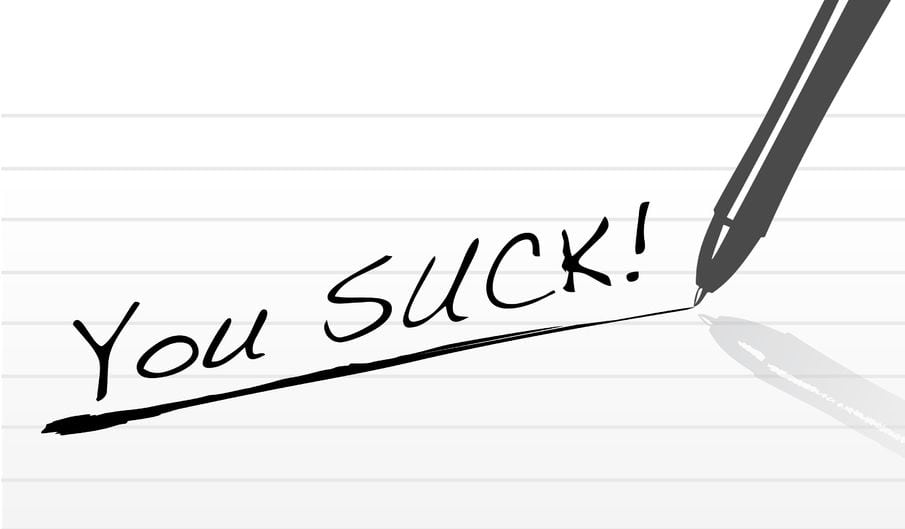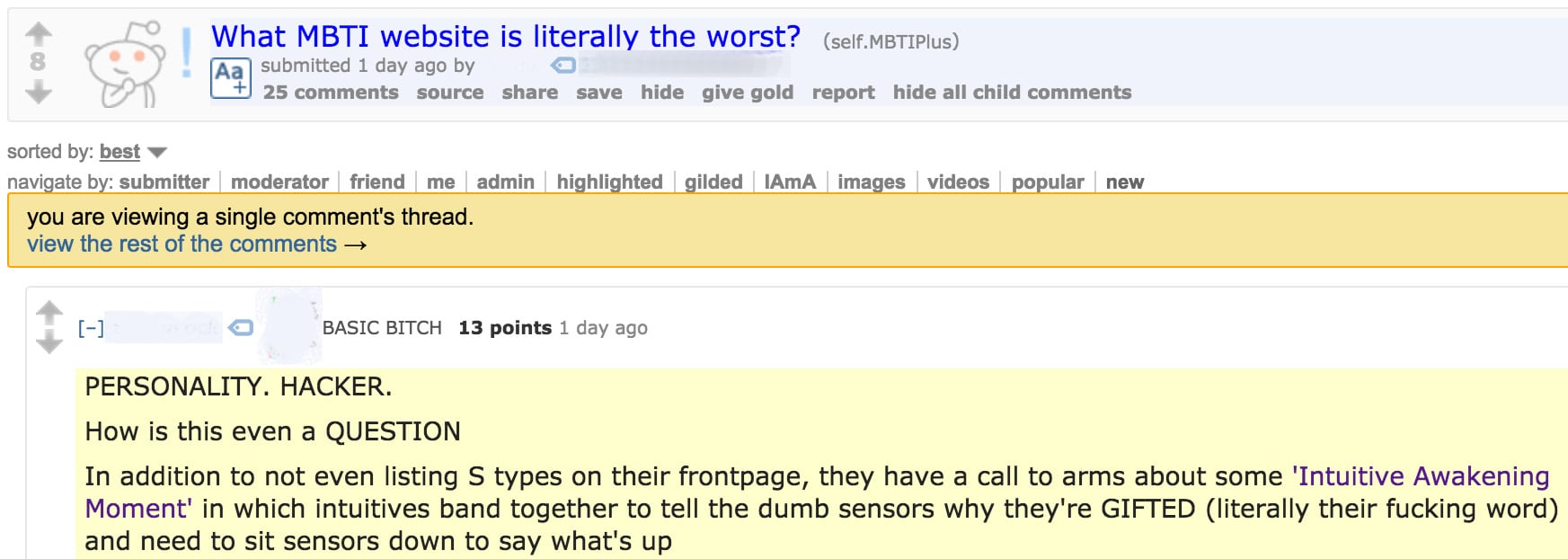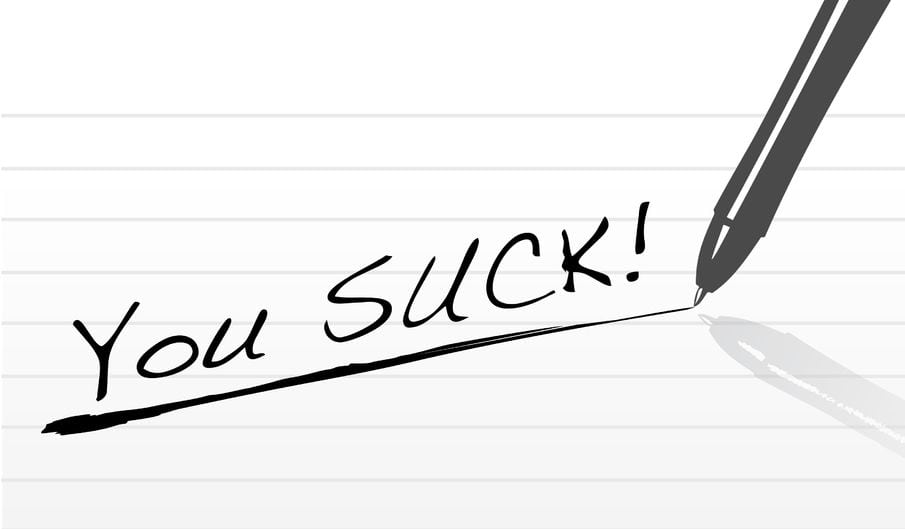
When You Need to Listen to the Criticism
That’s not to say all negative feedback exists because other people are just jelly. There are criticisms we need to hear, and sometimes it comes from the most caustic sources.
In the above example, the criticism I’m hearing is “make sure you communicate more effectively.” The reason we don’t have the Sensor types on our front page is because (at the time of writing) this is a brand spanking new website design for us and we haven’t finished all the type pages yet. Our core demo are the iNtuitive types and so we designed their pages and wrote content for them first.
I knew it felt incomplete to me to only have the iNtuitive types on the front page drop-down menu, but I didn’t think it was sending a message. So, I’m now more aware and will be making sure to complete those Sensor pages asap.
Holding space for criticism may be the most difficult thing you do as you scale up in your mission. Remember, you’re pre-programmed to see strong criticism as the first step toward literal death. But in order to be the best version of yourself and to optimize your message you have to be able to separate the wheat from the chaff.
If your ego is afraid it’s going to die from the negative feedback, let it. Let go of the pride. Remember these ancient fears once kept us safe, but they aren’t really necessary anymore. You’re going to be fine. It’s the mission that’s the important thing.
And for pete’s sake, don’t let it stop you. The fear of negative feedback stops so many people. Don’t be a statistic. Scale up. Thicken the skin while keeping the heart soft and compassionate.
Be a thought leader.
-Antonia
How do you deal with negative feedback, and what are some strategies you’ve discovered to stay strong in the face of criticism?
Want to learn more?
Discover Your Personal Genius
We use an online app called Mention. It’s a program where you plug in search terms and the app crawls the web for every instance those terms are mentioned. We find it way more effective than the free Google version, and if you run a website or have a company with an online presence it’s a great tool for keeping your finger on the pulse of how your brand is doing.
Most of the time the ‘mentions’ we get are positive. And then, everyone once in a while, this happens:

When your website is called “literally the worst” by anyone (even if their self-assigned Reddit flair is ‘basic bitch’) it’s going to sting. I’m pretty sensitive to negative feedback and a big part of my growth path as PH gains more traction is to be able to sit with and hold space for negative feedback.
Now, my first reaction was to make an apologist post. I truly hate being misunderstood, and I feel like the above feedback is a breakdown in communication.
 My second reaction was to mentally write this person off (as well as what seemed to me to be bandwagon jumpers that comprised the rest of the conversation) and think, “Make your own website then. Maybe you should hustle as hard as you hate.”
My second reaction was to mentally write this person off (as well as what seemed to me to be bandwagon jumpers that comprised the rest of the conversation) and think, “Make your own website then. Maybe you should hustle as hard as you hate.”
A major theme in my personal growth path is to sllloooooowwwww everything doooowwwwwnnnnn, and respond instead of react. This has been a hard won lesson for my reactionary ENTP brain, and that goes double when my Harmony 10 Yr Old (aka Extraverted Feeling tertiary) process experiences rejection.
So, while I’ll be addressing the comments of the above post (are we literally the worst and an iNtuitive superiority site?), it became clear to me that there’s a growth opportunity if I also address something all of us on a mission face: how to deal with push back and caustic feedback from the world and not simply give up.
Dealing with Push Back
From the moment humans realized how much easier it is to survive in large groups there’s been one rule: don’t get booted out of the tribe. Our sensitivity to feedback is a finely-tuned instrument we’ve created to gauge just how close we are to being ousted.
When we receive negative feedback we forget we live in a global community. That’s very new for humans, who are used to living in tribes of about 150 people. The feedback triggers our, “Oh, shit, does everyone feel this way?” mechanism and we subconsciously fear if that one person influences the other 149 people we’ll be given the boot and left as scraps for hyenas.
That’s pretty ancient programming. But that doesn’t matter one whit to our sympathetic nervous system, the part of us that’s ready to get into action when it’s ‘all goin’ down’.
Negative feedback, like gossip, has always been used to promote unspoken social contracts within a community that has each other’s backs. It’s evolved from ‘don’t kill that dude because you want to mate with his woman’ all the way up to “OMG, you’re going to wear those shoes with that outfit?”
If the ancient parts of us think we’re literally about to die from the negative opinions of others it makes sense why so many people play it safe. Reason would say that we’re way past the time period where being booted from the tribe is essentially a death sentence. But that requires us to be reasonable people, which we’re not. We’re a hodge-podge of multiple programs running, and usually we don’t even know how much on autoresponder we are until we’re 1) given an opportunity to observe our programming and 2) have the fortitude to actually see it for what it is (and not spin a narrative to rationalize it away).
When we’re ‘on mission’ we generally do as much as possible to be disruptive to the establishment. We’re addressing something we believe needs to be changed, and the bigger the thing that needs to be changed (i.e. the bigger the establishment) the more push-back we’re going to get.
Most establishments have become organisms, and organisms are self-protective. When they sense a foreign entity their number one goal is to hemorrhage it out.
Society is no different. When we have a Big Game message we’re not just fighting the establishment, we’re also fighting its anti-bodies, aka everyone who likes things the way they are.
Let’s use the example that prompted this article, the Reddit user that nominated us “literally the worst.”
Self-Protective Organisms
There are a couple of things one must understand about the context of this comment. First, the subreddit this thread was in has as its #1 rule “No intuitive bias.” Second, the poster is a Sensor.
The Myers-Briggs world is pretty iNtuitive biased. This makes sense as iNtuitives are the most likely to observe and appreciate speculation and pattern recognition. Type is almost entirely based upon pattern recognition since there’s very limited scientific evidence at this time.
iNtuitives are also a fairly disenfranchised group. It’s common for an iNtuitive, upon learning of the Sensor/iNtuitive dichotomy, to identify it as the cause of their problems and challenges. And if that person hasn’t learned the life lesson that sometimes things just are and no one is necessarily to blame, it’s very easy for the iNtuitive to start blaming Sensors.
Sensor bashing is rife in online communities, and it’s totally understandable that Sensors attracted to the Myers-Briggs system would get tired of that shit real fast. A rule of “no intuitive bias” is a pretty clear indication that the bias exists. That particular subreddit is then biased against the bias.
A site dedicated to empowering iNtuitives looks just like all the other sites that act as if iNtuitives are better than Sensors. Which we emphatically do not, but that’s like identifying the natural blonde in a world of bottle blondes. A cursory glance isn’t going to be enough to tell the difference.
I say all that to express sympathy for the person that called us “literally the worst.” But that’s not the complete story.
In any world where a subgroup of people are dominant in numbers and/or influence, there’s going to be fear of destabilization if the world changes to accommodate a different demographic. Sensors have always outnumbered iNtuitives, but the world of changing technologies have required us to adapt fast and Sensors aren’t known for rapid adaptation.
It seems as if types who use the cognitive function Introverted Sensing (SJs in the Myers-Briggs system) are the most adaptable over time. But this world isn’t giving us time, and it’s putting huge strains on all of our infrastructural systems to keep up. Infrastructural systems that are primarily maintained by Sensors.
Books like Rise of the Creative Class and Blink illustrate that a more intuitive approach is increasingly necessary. From the perspective of many compelling models, we’re a society on an exponential growth curve indicating that things are only going to be getting more cray-cray, not less.
The current infrastructures and institutions of society – government, the education system, religious systems, the commercial world, etc – all have traditionally favored a Sensor approach. On a macro level the world rewards sensory characteristics – the work ethic, the desire to build a quiet and comfortable life, traditional values – and people tend not to question what’s already been established.
Any sufficiently established institution becomes an organism, and iNtuitive values can seem like foreign entities requiring the aforementioned hemorrhaging.
So even if there weren’t savvy but fed-up Sensors that understand the S/N dichotomy split, there would still be push back from the world for something like an Intuitive Awakening. There are countless stories of disruptive iNtuitives of the past being fed things like Hemlock cocktails for their efforts. It’s not a new story, just one we might be finally ready to listen to.
If you’re a Sensor this is really easy to dismiss, just like it’s easy for me as an Extravert to dismiss the pain with which Introverts have to deal. But that doesn’t change the fact that for those Introverts the pain is real.
iNtuitives as a demographic deal with things Sensors don’t have to even think about, and an Intuitive Awakening is meant to address those concerns.
Saying an Intuitive Awakening movement is ridiculous is like saying the recent Introvert movement is ridiculous. There has been and continues to be a need for awareness around introversion, as expressed by how relieved Introverts are to have language for all the phenomenon they experience in a Extravert’s world.
The same thing applies to iNtuitives in a Sensor world. As much as Sensors may not understand how this impacts iNtuitives, it doesn’t matter. As an Extravert, myself, I sometimes wonder if Introverts are just being whiny. And then I remember I have no fucking clue what it’s like to be an Introvert. There’s clearly pain there, and if they need a movement to feel empowered, then I’m glad the world is ready to give it to them.
How Much to Care About the Feedback
So, how much am I going to care about people who give negative, even caustic, feedback?
In this particular case it’s a tricky balancing act. On the one hand, Sensors are going to have to be a part of the Intuitive Awakening movement since the point is to get the social unconscious to accept that iNtuitives exist at all. Sensors already into Myers-Briggs are going to be some of our most important allies.
On the other hand, there’s going to be push-back from people sensitive to how abusive iNtuitives may have been toward them in online communities. If they’ve been on the receiving end of this abuse chances are they’re not going to be lining up to be the cheer leading section of this movement.
So, the only thing we can really do is take it on the chin, recognize we’ve got our work cut out for us and do our best to be a good example.
The more empowered iNtuitives are – the more they’re working on themselves and developing as the highest versions of themselves – the less likely they are to be dicks to other people, including Sensors. The less dickishness iNtuitives exhibit, the more friendly Sensors will be to this movement.
And the goal isn’t to make Myers-Briggs savvy Sensors more accepting of iNtuitives. The goal of the Intuitive Awakening movement is to get the S/N dichotomy split into the social unconscious so that when iNtuitive parents have a Sensor child or Sensor parents have an iNtuitive child there isn’t a “what the hell is wrong with you” mentality going on.
In general, though, feedback of all kinds is a GOOD sign.
My brother is a well known writer of Science Fiction. His books (along with his writing partner) are doing extremely well, and just this past year were turned into an acclaimed TV show on the SyFy network. He was recently interviewed about how he feels when people say how they could have done something better in either the books or the show and he said, “The sad fact is if nobody is giving you a hard time on the internet it’s because no one has heard of you.”
The more powerful your message is the more polarizing it will be.
It doesn’t matter how much positive intent you have, how great the pains you take to be crystal clear, or how important your message is. People are at stratified levels of development. People are in pain.
As insecure as you may feel on your road to delivering a message, other people are just as insecure. In fact, more so. Otherwise they’d be sticking their necks out to deliver a message.


Share:
ENTP Survey: 5 Things ENTPs Wish They Had Known as Teens
[PHOTOS] Portland, Oregon Meetup (May 19, 2016)
17 comments
Hey Antonia. I feel very happy to see your progress, it gives me hope for myself and I find it quite inspiring. I found such tremendous maturity, grace and empathy in your post. And such vulnerable humanity, like all of us. You completely understood where they are coming from and instead of judging them back, you understood them. There is a quote by Spinoza on similar lines – that one should try not to mock, deride, belittle others, but to understand them. It’s definitely something that happens slowly – it’s so much easier to react than meaningfully respond and keep your perspective, aim, and mission in sight – it is almost like you zoomed out first for distance and then zoomed in and saw all the little but significant details that must have triggered the commentator’s reaction and your own initial discomfort. I congratulate you once more because to me, it feels like a milestone – which is not to say it’s not tempting to fall back into the trap of reacting vs responding – but for now it seems worth celebrating.
I happen to be listening to episode 10 of your podcast called Feedback at the moment, which relates to this blog. I deal with negative feedback in a number of different ways in the different situations I find myself in, such as from family, friends, rivals, online, work, etc…The strategy that I found I use the most is understanding their perspective first then analyzing what, why, and how negative feedback was said. At first, I do feel an immediate reaction, but use my own discipline to restrain myself to not let my reaction out of control, I then calm down and move through what I’m feeling. I found that you had mentioned an 8 minute time to feel the emotion and go through the emotion in the podcast as well, in which I find myself doing which works great. Another strategy I do is ask myself what have I done as in action to receive negative feedback, usually I will notice that I didn’t consider something, I mean how can we always know and do everything, so I find that usually the problem. I have come to find that I have difficulty in receiving negative feedback in the form of assumptions and them leading to believe something that isn’t true and I have considered ignoring the ignorance, but it doesn’t help. I have found that you cannot correct them in their way of thinking and you can’t take every feedback as just, so for those offensive feedback I’ve learned to confront them and get down to the root of the feedback as well as stand my ground.